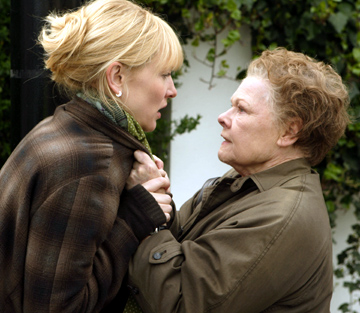 Cate Blanchett is in Judi Dench’s grip in ‘Notes on a Scandal.’ Relax! You both \r\ngot Oscar nominations!
Cate Blanchett is in Judi Dench’s grip in ‘Notes on a Scandal.’ Relax! You both \r\ngot Oscar nominations!
|
| Notes on a Scandal\r\nStarring Judi Dench and Cate Blanchett. Directed by Richard Eyre. Written by Patrick Marber, based on Zoë Heller’s novel. Rated R. |
|
A D V E R T I S E M E N T
|
|
|
|
A D V E R T I S E M E N T
|
|
Teacher’s Pet
Judi Dench takes Notes on a Scandal and reveals the blackness of one woman’s soul.
By KRISTIAN LIN
The tabloids would have you believe that movie stardom is exclusively for young hotties, but take a look at 72-year-old Judi Dench. She spent decades toiling in British theater and television, but her film career only started to flourish 10 years ago, after her Oscar-nominated turn in Mrs. Brown. Since then, she’s become like Meryl Streep, a default choice for Best Supporting Actress nominations. This has held true even for her work in shaky movies like Chocolat or Mrs. Henderson Presents. Still, she emerged unblemished even when miscast (The Importance of Being Earnest) or when appearing in total crap (The Chronicles of Riddick — how’d that happen?).
In Notes on a Scandal, she gives her greatest film performance yet, and does it partly by going against type. Usually cast in sympathetic parts, she still often gives out a vibe of someone who’s not to be messed with. Seeing her as M in the James Bond flicks, Queen Victoria, or Queen Elizabeth made you wonder what might happen if she applied her intelligence and imperious presence to a villainous role. Well, this movie answers that question. She’s one badass bitch, and her badassery is what makes this sudsy opera so much fun.
Dench plays Barbara Covett, a self-described “battle-ax” of a history teacher at a convincingly chaotic and run-down school in the working-class London borough of Islington. Her hard exterior does not conceal a softer side. In her personal diary, she pens withering assessments of everyone in her life — students, fellow teachers, bureaucrats, neighbors, relatives — laced with petty comments about their weight or their looks. She even makes fun of a kid with Down syndrome, which takes a special kind of poison.Into her solitary existence drops Bathsheba Hart (Cate Blanchett), who joins the school as its new art teacher. Idealistic, sheltered by wealth, and a bit out of her depth dealing with rowdy adolescent kids, Sheba makes a perfect target for Barbara. Dissatisfaction with her marriage to a much older professor named Richard (Bill Nighy) leads her into the arms of Steven Connolly (Andrew Simpson), a 15-year-old Irish boy who thinks she’s so beautiful. When Barbara discovers that they’re having sex, she doesn’t report Sheba to the authorities. Instead, she uses the information as leverage to take control of her colleague’s life.
The movie is based on a brilliant novel by Zoë Heller, and it’s unbelievable that the filmmakers didn’t keep its title, What Was She Thinking? The book, narrated from Barbara’s point of view, is an etched-in-acid portrait of a woman who mercilessly sees through everyone except herself. Barbara remains blind to her own pattern of forming one-sided erotic attachments to younger women, which go well beyond mere sexual desire. She really wants to own Sheba’s ass rather than knocking off a piece of it.
Screenwriter Patrick Marber renders Barbara’s nasty private thoughts in memorable phrases — Sheba’s children are “a pocket princess and a tiresome court jester,” while the school’s mostly nonwhite students are “our nation’s future plumbers and shop assistants, and probably terrorists as well.” Even better than his peppery dialogue is his repair job on the book’s one major structural flaw; the way Sheba’s secret becomes public knowledge is handled much more persuasively.
Barbara’s voice in the novel denies the other characters their decency and humanity, but in the movie, the actors bring those qualities home. The lumpish Steven comes to realize what a psychological mess Miss Hart is, while Richard is crushed by his wife’s infidelity despite half expecting it. (Nighy’s reading of Richard’s final speech to Sheba will tear you to pieces.) Blanchett’s subtly good, too, showing how logically Sheba’s unexceptional marital neuroses lead to her disastrous affair. These performances are worth savoring in themselves, but they also illuminate the profound destruction that Barbara wreaks on everybody’s lives. Even hideous, hateful Barbara has her frailties; watch her come unglued when her cat is diagnosed as terminally ill. Dench lets us see the terrible loneliness and emotional neediness that drives Barbara to do what she does.
Nevertheless, the actress’ forcefulness and innate impatience with niceties and charm go a long way to ensure that Barbara remains unredeemable. Such an evil character could easily be intolerable company, but Dench also brings out Barbara’s brutal honesty and wit. When the school’s bespectacled, middle-aged math teacher (Phil Davis) comes to her house to confess his crush on Sheba, it’s evil fun watching Barbara toy with this pathetic man before dropping the hammer on him. Notes on a Scandal is full of such juicy pleasures, with its overtones of blackmail and poorly repressed lesbian lust. At times it threatens to overheat, especially when Philip Glass’ music kicks in, but the script’s focus on its characters’ goodness and the high level of acting makes the movie a work of art as well as a satisfying piece of soapy cinema. Judi Dench has left us with so many tea-and-crumpet British movies, it’s gratifying to see her do her best work sinking her teeth into this meaty B picture.
 Email this Article...
Email this Article...

